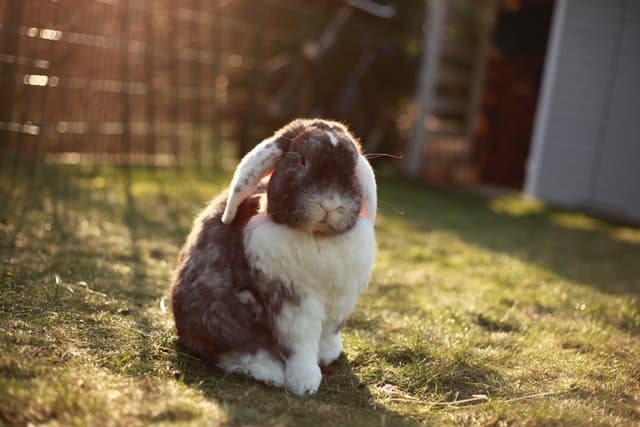
We must pay close attention to the care of our rabbit in times of high heat. Rabbits are one of the domestic species most susceptible to heat, in fact they tolerate more than 27ºC very badly and above 30ºC they can suffer a heat stroke. This is because the rabbit’s fur is not prepared to withstand high temperatures.
In this post we will see a little more about the care for rabbits during the hot season. In addition, we teach you how to prevent and how to act urgently in the face of heat stroke.
How to take care of my rabbit in hot weather?
To take good care of your rabbit in summer, remember to always leave fresh and clean water at its disposal. Also, your drinker, feeder, and cage should be in a cool, well-ventilated place. If they are left in the sun or in a very hot region, the water will heat up and the food can spoil. Hydration is a key care to preserve the good health of rabbits during the hot season. In addition To complement the feeding of the rabbits during the hot season we can offer them lettuce and fresh fruits. These foods provide your body with water and help keep you well hydrated.
If the rooms in our home are very hot in summer we can place a fan. In this case, the wind must never be directed at the rabbit, but must spread throughout the environment to cool it. An inexpensive and effective remedy is to freeze water in a plastic bottle and leave it in the cage for you to lie down nearby if you like. You can also put a few ice cubes in the drinking water to keep it from getting hot.
Hair and feeding:
Combing our rabbit is also a very important factor since it helps to eliminate excess hair and thus prevent it from going through so much heat, especially in rabbits with thick or long hair (As is the case with Tambor, my lion’s head rabbit).
Obese animals are more susceptible to heat, in addition to being able to more easily develop some pathologies associated with being overweight and / or sedentary. In addition to providing him with a balanced diet, remember to respect the amount of food that is appropriate for its size, race, age and health, as well as to provide them with opportunities to exercise and express themselves freely.
Finally, if we want our rabbit to enjoy a time of probation in the garden or in the park, we will do it at times when the sun does not heat up so much (first thing in the morning, late in the afternoon) when, in addition, our rabbit he is usually more active.
Symptoms of heat stroke in rabbits
Some signals allow us to easily perceive if our rabbits are affected by intense heat. When identifying them, it is essential to act quickly to prevent the pet from becoming dehydrated. These are the main symptoms of heat in rabbits:
- Excessive panting
- Apathy and little desire to play.
- Lethargy.
- Lack of appetite.
- Stretch your legs and lie down with your belly on the floor to cool off.
These tips will be very useful to prevent heat stroke in our rabbits. However, it is also important to know how to act in this situation to help our pets.
- To lower the rabbit’s body temperature, we will start by taking it to the coolest area of our house.
- Then we will apply a little fresh water – not cold or ice – on the armpits, on the head and on the animal’s pads. For this we can use a clean cloth, gauze or cotton.
- If we observe that the body temperature is still very high, we can spray a little water on its fur. The goal is not to bathe the rabbit, just slightly dampen its fur to refresh it.
- We will also leave fresh water available to the rabbit, but we must not force it to drink it.
- Meanwhile, we will strive to refresh our bunny’s environment so that he can be calm and comfortable.
- If our rabbit does not react, it will be essential to seek emergency veterinary attention .
In this process, we should never suddenly cool the rabbit to avoid a thermal shock. Therefore, we will not use ice or cold water to lower your body temperature.
We recommend taking our rabbit to the vet even if it recovers with these basic guidelines.






